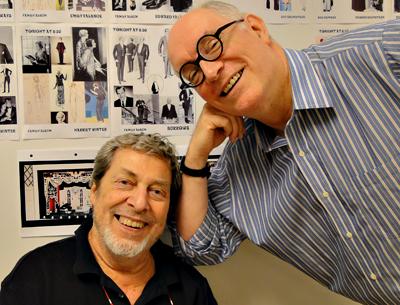Noel Coward, ‘Tonight at 8:30’

The surprise that is Noel Coward is coming to the John Drew Theater at Guild Hall next week, starring Blythe Danner and Simon Jones, and directed by Tony Walton, in the form of “Tonight at 8:30.”
Coward wrote the show in the 1930s as a touring vehicle for himself and his longtime friend and working partner Gertrude Lawrence. It’s actually a collection of 10 one-act plays. Each night the partners would choose three to perform, at, of course, 8:30.
Coward is usually thought of as sharp-witted and erudite, which he was, but also patrician, which he was anything but.
“Coward was lower class. He was introduced to the upper class in his early teens and was appalled at their behavior and their hypocrisy,” Mr. Walton said in a recent interview. “He was able to absorb it, tease it, satirize it” in his writings.
“The very first play is about class,” the director said of “Hands Across the Sea,” which leads off the evening, followed by “Family Album” and “Red Peppers.”
Thematically, Mr. Walton is loosely tying the production together with “Red Peppers,” a play about a bickering vaudeville couple. The concept of class and class differentiation can prove elusive for American actors, something the director is well aware of.
When he first came to New York, he spent several years going to the Actor’s Studio as an observer, “just to see Marilyn,” he said with a smile. Actually, he was soaking in the vibrant creativity of the city’s theater community of the 1950s. He saw firsthand the difficulties actors can have in handling Coward material.
He recalled, for example, watching Shelly Winters and Albert Salmi do a two-minute scene (“It took about 20 minutes”) from “Private Lives.” Paul Newman critiqued the exercise afterward, in the rather cutting manner that was encouraged at the Studio at that time. “That’s ridiculous,” he said, according to Mr. Walton. “You should have treated this like a piece of music.”
In the lead opposite Ms. Danner is Simon Jones. “I was born and brought up on an estate,” Mr. Jones, a Brit, said recently. The lord of the manor was down on his luck. To his face, he was “m’lord,” but among Mr. Jones’s fellow working-class residents of the estate, he was simply “Lordy.”
Mr. Jones believes the challenge to Americans playing Coward is simply a question of confidence, something Ms. Danner does not lack.
The production came about following an exchange among Josh Gladstone, artistic director, Ms. Danner, and Mr. Walton, who were looking for a good project. Ms. Danner had done “Tonight at 8:30” in Williamstown, Mass., in 2000, and was eager to do it again. She’d performed two of the three plays there, but in one of them, “Family Album,” she’ll be playing a different part at the John Drew.
“This is Noel Coward telling little tales,” Mr. Walton said of the material. “He called them ‘After-Dinner Mints.’ ”
Mr. Walton agrees that Noel Coward should be treated as “a piece of music,” but knows there is more to it. After putting together the cast, he went on a search for an interview done many years ago with the actress Irene Worth, in which she was asked about the different approaches to acting she had encountered in her long career.
“You know who was the most remarkable method actor I ever worked with?” she responded. “Of course he’d be horrified to hear me say it, but Noel Coward. There wasn’t anything he’d do on stage that wasn’t truthful. Not necessarily realistic, but absolutely truthful.”
Mr. Walton came to directing after a stellar career as a designer. Both his parents happened to have been born near Mr. Coward’s native town, Teddington, in England, and growing up, Coward was a personal hero of his.
He came to America to pursue a stage designer’s career and to be with his future wife, Julie Andrews, who was starring on Broadway in “The Boyfriend” (and later in “My Fair Lady”).
It was Noel Coward himself who gave Mr. Walton his first big break, hiring him to design the set and lights for “Conversation Piece” in 1957. While Mr. Walton felt at ease with scenic design, lighting was another matter.
Mr. Coward was quite subtle when necessary, said the director. One day, during rehearsal, he called Mr. Walton over to talk about the lighting.
“Young Tony. Do we really believe that the summer in Brighton in 1815 was this dire and gloomy?” he inquired.
During the lunch break, Mr. Walton worked with Abe Feder, a legendary lighting designer and one of his mentors in the business, to alter the design. When Coward returned after lunch, he looked at the stage for a moment. “I see the weather in Brighton seems to have improved considerably,” he said dryly.
“Tonight at 8:30” opens on Wednesday and will run through Aug. 4, Tuesdays through Sundays, at you-know-what-time, with Sunday matinees at 2. Tickets range from $50 for the orchestra (preferred seating is $60) to $30 for the balcony, with a small discount for Guild members.
